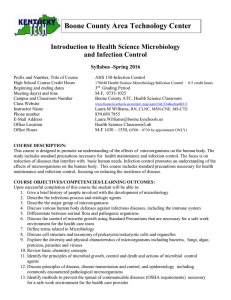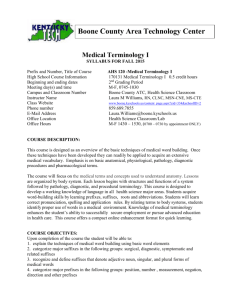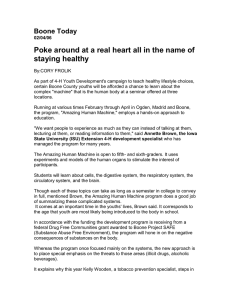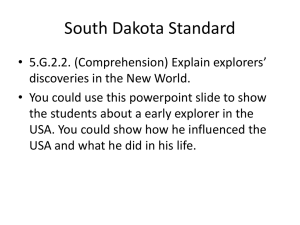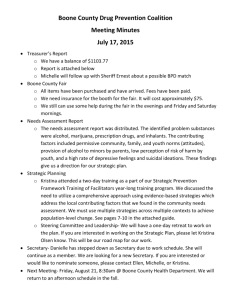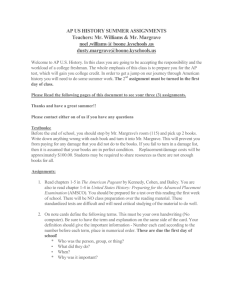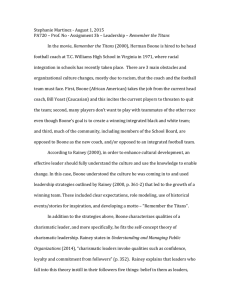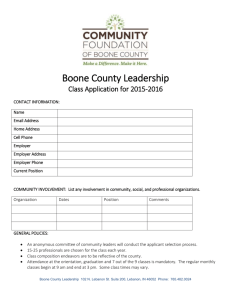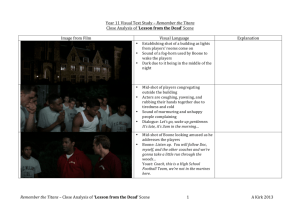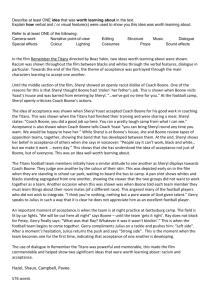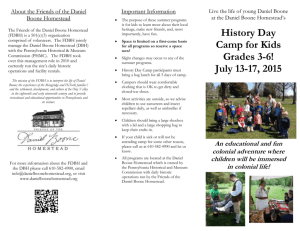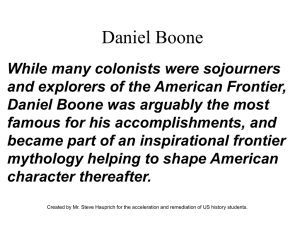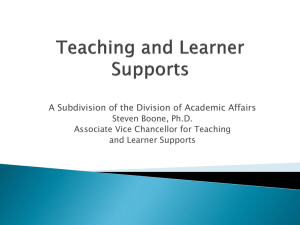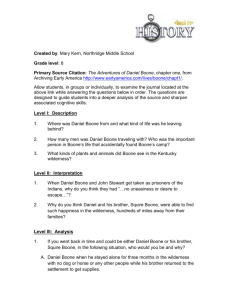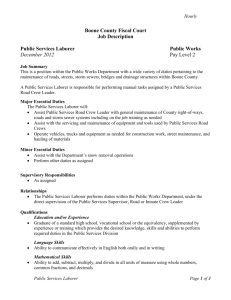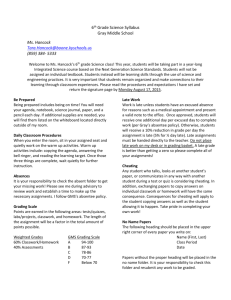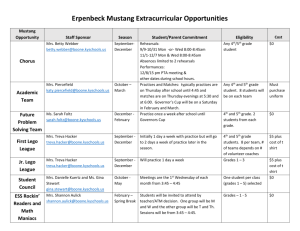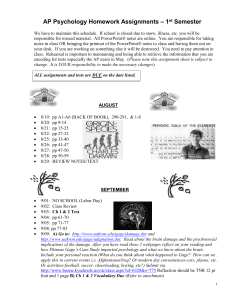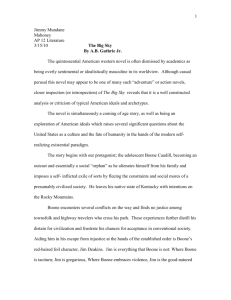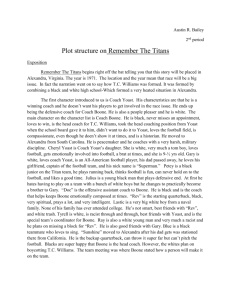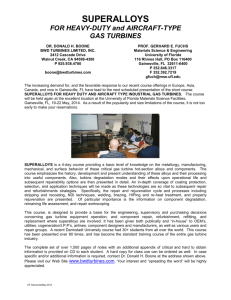SYLLABUS - Boone County Schools
advertisement
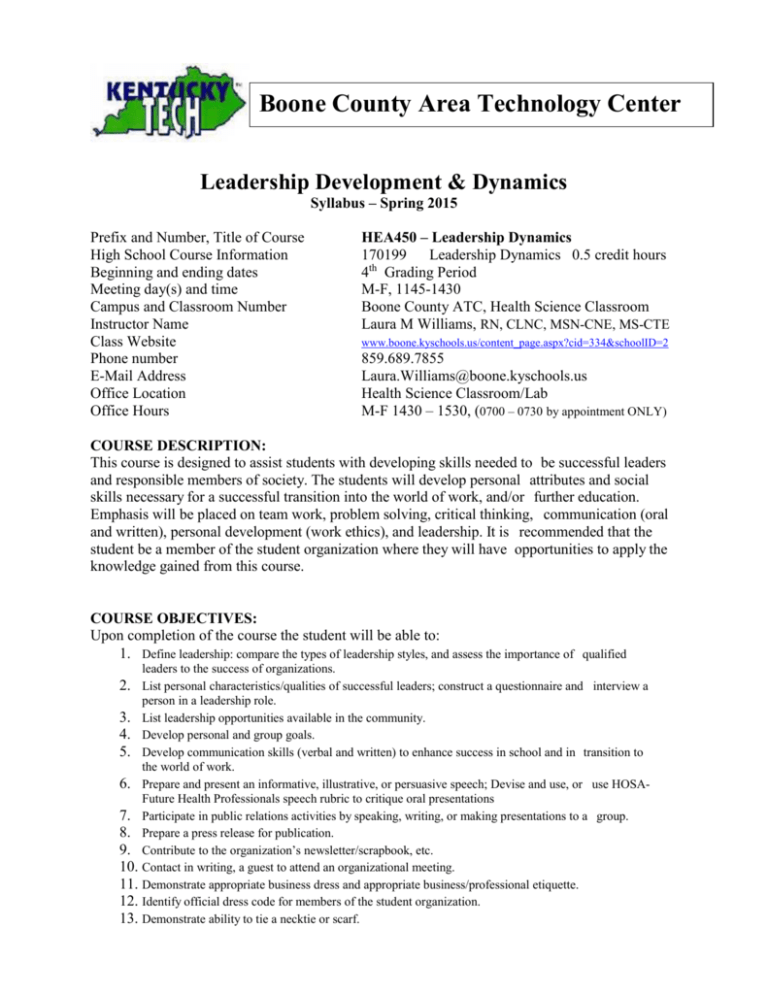
Boone County Area Technology Center Leadership Development & Dynamics Syllabus – Spring 2015 Prefix and Number, Title of Course High School Course Information Beginning and ending dates Meeting day(s) and time Campus and Classroom Number Instructor Name Class Website Phone number E-Mail Address Office Location Office Hours HEA450 – Leadership Dynamics 170199 Leadership Dynamics 0.5 credit hours th 4 Grading Period M-F, 1145-1430 Boone County ATC, Health Science Classroom Laura M Williams, RN, CLNC, MSN-CNE, MS-CTE www.boone.kyschools.us/content_page.aspx?cid=334&schoolID=2 859.689.7855 Laura.Williams@boone.kyschools.us Health Science Classroom/Lab M-F 1430 – 1530, (0700 – 0730 by appointment ONLY) COURSE DESCRIPTION: This course is designed to assist students with developing skills needed to be successful leaders and responsible members of society. The students will develop personal attributes and social skills necessary for a successful transition into the world of work, and/or further education. Emphasis will be placed on team work, problem solving, critical thinking, communication (oral and written), personal development (work ethics), and leadership. It is recommended that the student be a member of the student organization where they will have opportunities to apply the knowledge gained from this course. COURSE OBJECTIVES: Upon completion of the course the student will be able to: 1. Define leadership: compare the types of leadership styles, and assess the importance of qualified leaders to the success of organizations. 2. List personal characteristics/qualities of successful leaders; construct a questionnaire and interview a person in a leadership role. 3. List leadership opportunities available in the community. 4. Develop personal and group goals. 5. Develop communication skills (verbal and written) to enhance success in school and in transition to 6. 7. 8. 9. 10. 11. 12. 13. the world of work. Prepare and present an informative, illustrative, or persuasive speech; Devise and use, or use HOSAFuture Health Professionals speech rubric to critique oral presentations Participate in public relations activities by speaking, writing, or making presentations to a group. Prepare a press release for publication. Contribute to the organization’s newsletter/scrapbook, etc. Contact in writing, a guest to attend an organizational meeting. Demonstrate appropriate business dress and appropriate business/professional etiquette. Identify official dress code for members of the student organization. Demonstrate ability to tie a necktie or scarf. 14. Outline techniques used for proper business/professional etiquette: -- meeting people, travel and table etiquette. 15. Serve as host when the guest you invite attends a meeting. 16. Participate in an installation ceremony or opening and closing ceremonies 17. Analyze organizational structures and their components (including bylaws, officers, committees, and program of work: Identify mains components and compare local, state and national bylaws. 18. Prepare a program of work, including educational/leadership, civic, social, and financial activities. 19. Evaluate a previous program of work 20. Name the chapter officers and list the duties of each office; arrange in order the steps of the election 21. 22. 23. 24. 25. 26. 27. 28. 29. 30. 31. 32. 33. 34. 35. 36. 37. 38. 39. 40. 41. 42. 43. 44. 45. 46. 47. 48. 49. 50. 51. 52. 53. 54. process (application/nomination, test, etc.). Describe how committees are established. List the standing committees and their responsibilities Serve as a chairperson or member of a committee Demonstrate the use of parliamentary skills in presiding over a meeting. Explain the history and purpose of parliamentary procedure. Identify the authority used for parliamentary procedure. State the function of the gavel. List the steps for handling a motion; identify the classes of motions. List the rules for debate. Prepare an agenda; Participate in a mock meeting. Conduct research on a community organization that uses parliamentary procedure. Learn about HOSA-Future Health Professionals. Recite mission, motto, and creed. Label parts of the emblem and explain the meaning of the colors. List the organizational levels and dues for each level. List publications and resource materials available. Name leadership training conferences available. Prepare a realistic budget based on program of work and resources available. Participate in fundraising efforts. List the categories of competitive events and select an event to compete in at local, regional, state or national level. Develop techniques to resolve conflict that arises in the home, school, community, and workplace (conflict management). Describe how ethical and social behavior affects our lives. Demonstrate an awareness of cultural diversity and equity. Demonstrate shared decision. Identify self-management techniques. Identify stress management techniques. Prepare an Employability Skills Portfolio. Prepare a cover letter; Resume; Application. Answer in writing questions you may be asked at an interview. List questions you might ask at an interview. Participate in a mock interview (this could be a HOSA-Future Health Professionals Job Application Competition). Write a thank you letter to the interviewer. Discuss reasons for changing employment. Write a letter of resignation. REQUIRED TEXTBOOK, TOOLS AND/OR SUPPLIES: The 7 Habits of Highly Effective Teens (Sean Covey) The Student Leadership Challenge Series (Kouzes & Posner) Diversified Health Occupations (7th Ed) by Simmers, Louise. Delmar publisher. GRADING/EVALUATION STANDARD: Tests - 60% Workbook, assignments, worksheets, and quizzes -20% Leadership Journal – 10% Employability -10% [5 points each day are available (grade posted weekly); a point for each: 1) on time to class, 2) prepared for class, 3) awake and alert throughout entire class, 4) positive contribution to class discussion and activities, and 5) professional attitude and behavior throughout entire class]. MAKE-UP POLICY FOR MISSED WORK: Missed work that is not made up within one week of return to school will receive a grade of zero. CLASS ATTENDANCE POLICY: Attendance policy is set by the home high school. Excessive absenteeism will adversely affect the daily participation grade and therefore the grade as a whole. Refer to the Boone County ATC Student Handbook. WITHDRAWAL POLICY: Withdrawal from the class is based on the policies and procedures of each home high school. STUDENTS WITH DISABILITIES: All students with disabilities are identified through the home high school. Accomodations in the Individual Education Plan will be followed. Library and Information Services Students are encouraged the use the reference materials in the Health Science classroom. The libraries at each home high school are avalable to the student. Some assignments may require students to use the public library. The Boone Co ATC students are also welcome to use the library at Gateway Community and Technical College. GCTC has a variety of information resources available to students on the Boone, Edgewood, Highland Heights, and Covington campuses (including the Park Hills Center). Each of the three campus libraries (located at Boone, Edgewood and Park Hills Center), has a general reference collection in print. A large quantity of materials is available in electronic format, including electronic books, scholarly journals, peer-reviewed research and full-text databases, which may be accessed from any computer with appropriate passwords. In addition, the libraries at Northern Kentucky University and Thomas More College have contractual agreements with Gateway that allow GCTC faculty, students and staff to have complete access to their resources. Gateway is also a member of the Southern Ohio and Neighboring Libraries consortium, which provides reciprocal borrowing and lending privileges among academic and public libraries in the Cincinnati and Northern Kentucky area, including Kenton, Boone and Campbell public libraries. Program specific resources may be available for use in program-specific areas, classrooms or laboratories. Check with your instructor and/or the library staff for assistance is accessing these additional resources. You may contact the library at (859)-442-4162 or access the GCTC Library and Information Services website at http://www.gateway.kctcs.edu/new/library.htm for additional information. Elective Items CLASSROOM ETIQUETTE/RULES/REGULATIONS OF THE CLASSROOM: The classroom is a learning environment. Therefore only those activities related to the learning experience will be accepted in the class. Please come prepared with pen, pencil, paper, books or any other equipment designated for the class. Attendance Policy: Please refer to the Boone County ATC Student Handbook. Academic Integrity: Students are required to conduct themselves in conformity with normal expectation of academic integrity in their completion of assignments and examinations. Academic dishonesty includes, but is not restricted to, the following: Theft or abuse of another's work Alteration of any grade or other evaluation of one's own or another student's work in order to misrepresent its quality Unauthorized collaboration in completing work, including completing work for another and submitting another's work as one's own Use of resources prohibited by the faculty member Representation of another's work as one's own (plagiarism) Unapproved submission of the same work in more than one course Student Rights and Responsibilities: Refer to the student handbook for this information. Due to unforeseen circumstances, this syllabus may be adjusted to continue to meet learning objectives. Substantial changes resulting in an amended syllabus will be communicated to student and parent(s)/guardian(s) in writing in a timely manner. The student AND the parent(s)/guardian(s) must indicate IN WRITING that both parties have read this syllabus for HEA450 and will comply with all of the terms and conditions which are outlined.
